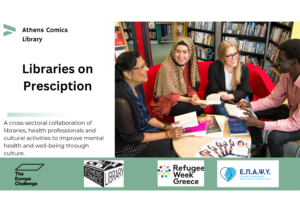The answer is yes!
Anyone who has read a comic book can probably guess that mental health and visual storytelling have a long and fascinating history together. From the anxieties of Charlie Brown to the childhood trauma of Mister Miracle, comics offer a varied and ever-evolving glimpse into mental illness. While none of these comics and graphic novels are substitutes for professional help, they nonetheless play a role in normalising discussions of mental health, offer unique perspectives on the innumerable forms mental illness can take, and, perhaps most importantly, remind those who are struggling that they are not alone. So, dig out your library card and dive right in.
Stories have the ability to change us at the emotional, social, behavioural and psychological level. Bibliotherapy goes back to Ancient Greece where libraries were considered as healing places for the soul, while after the First World War traumatised soldiers returning home were often prescribed a course of reading. At the same time, science proves that stories have the ability to mobilise certain parts of our brains and bodies facilitating empathy, compassion, and collaboration.
Libraries have transcended their traditional roles as repositories of books to become dynamic, inclusive, and secure community hubs. In today’s society, they stand as beacons of education, enlightenment, and inclusivity, forging stronger, more interconnected communities. Through equal access to knowledge, resources, and opportunities, libraries provide sanctuaries for individuals from diverse backgrounds, offering solace and quiet study spaces. They also stimulate intellectual curiosity, critical thinking, and the free expression of ideas, fostering open dialogue and lifelong learning.
Refugee Week Greece and Athens Comics Library worked together for The Europe Challenge: the Libraries Challenge, in collaborative efforts, contributing to the building of social cohesion. We fostered connections and understanding among community members, ultimately creating a stronger, more unified society. This partnership actively championed diversity and inclusivity. By working together, we set an example for the wider community, demonstrating the value of embracing different cultures, perspectives, and experiences.
The Europe Challenge was launched in 2020 by the European Cultural Foundation to offer support, resources and funding to libraries and communities – to help explore how people can meet, live together and work in the Europe of today. If we are to respond to challenges including war, polarisation, cultural and economic crises, the people of Europe must lead the way in solidarity. People need safe spaces where they can come together and build understanding leading to a stronger sense of solidarity. Libraries offer just that opportunity. As trusted democratic spaces that provide deep-rooted connections to communities, municipalities and local governments, libraries offer a safe space for people across Europe to come together with their neighbours and fellow citizens to identify common problems and find solutions.
We also worked with 4 other libraries across Greece, to test-run the programme with a number of diverse communities in both urban and rural context.
- Patras University Library. Target group: young people, students.
- Psychiko Municipality, Athens, Public Library of Organisation for Solidarity, Culture and Sports. Target group: people with learning difficulties.
- Rapsani Municipality, Larissa, Public Library. Target group: elderly women in rural Greece.
- Ayia, Crete, Prison Library. Target group: Incarcerated Individuals.
The partnership acknowledged that mental health was a critical aspect of overall well-being. By combining our resources and expertise, we approached mental health challenges holistically, considering cultural, social, and emotional factors. Refugee Week Greece and Athens Comics Library, in collaboration, offered participation opportunities to individuals from diverse backgrounds. This not only promoted a sense of belonging but also empowered individuals to engage actively in their communities.
Aims and objectives of the programme “Libraries on Prescription” were to:
- reach and support the whole community regardless of age, gender, socio-economic status or educational attainment.
- create a Culture of Caring
- provide space where groups can come together and enjoy activities that are co-designed with local people, to meet their needs.
- offer local health support services available through ‘community hubs’, bringing together different partners’ offerings in a seamless way.
- create safe, welcoming and accessible physical and virtual environments freely open to all, which encourage participation, creativity and mutual learning and support.
- help local government and its partners deliver their strategic objectives, whether linked to community cohesion, health and wellbeing, economic growth, promoting independent living or increasing life chances.
This Programme was designed around the following 6 reinvention indicators:
- Reduction in level of anxiety and isolation
- Increased alternatives to clinical settings
- Improved access to non-formal education
- Repurpose spaces for well-being
- Improved social connection
- Increased cognitive stimulation
As libraries evolve and embrace their role as epicentres of community life, they are poised to play a pivotal role in fostering healing, inclusivity, and social cohesion for individuals and communities across Europe. By recognizing the enduring worth of libraries as vital community assets, we can continue to enrich lives, ignite intellectual curiosity, and for tify the social fabric of our societies. Through cross-sectoral collaborations, libraries will remain at the forefront of initiatives to improve mental health and well-being through culture.
tify the social fabric of our societies. Through cross-sectoral collaborations, libraries will remain at the forefront of initiatives to improve mental health and well-being through culture.
Please read the full report HERE, together with a Toolkit on how to set up a “Library on Prescription” at your local library.
Follow us
www.refugeeweek.gr
refugeeweekgreece@gmail.com
+30 698 3050292
Facebook: @Refugeeweekgreece
Instagram: @Refugeeweekgreece
contact@athenscomicslibrary.gr
Facebook: @Athenscomicslibrary
Instagram: @Athens_Comics_Library
Guest blog by Dina Ntziora